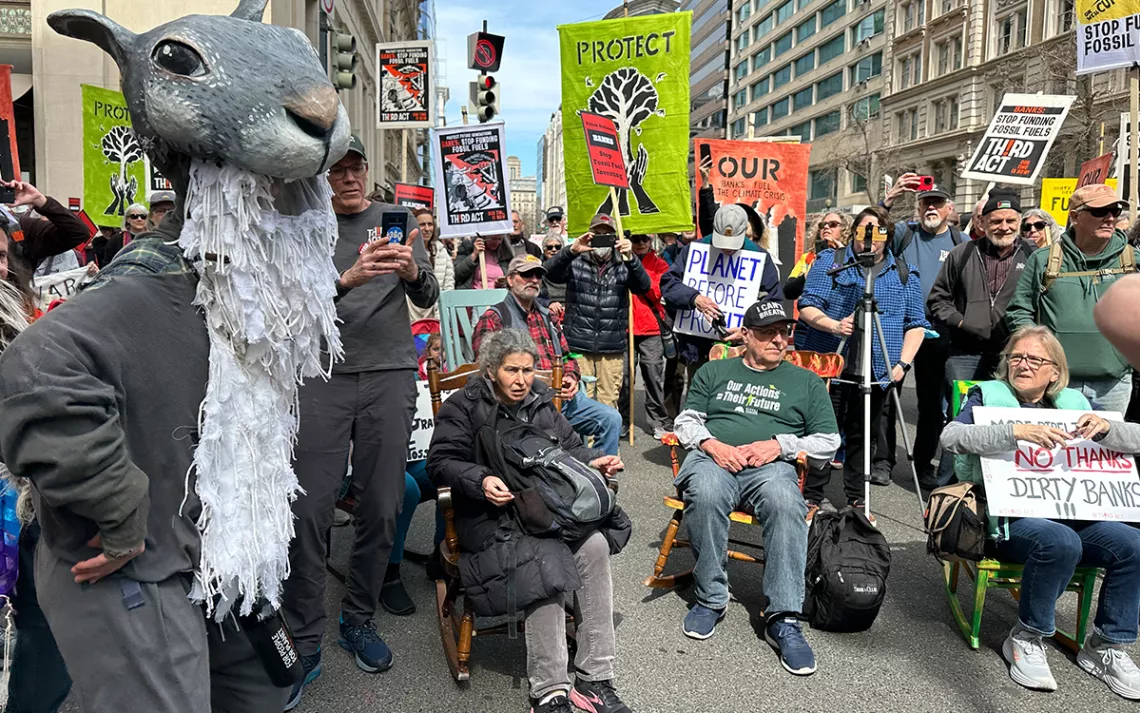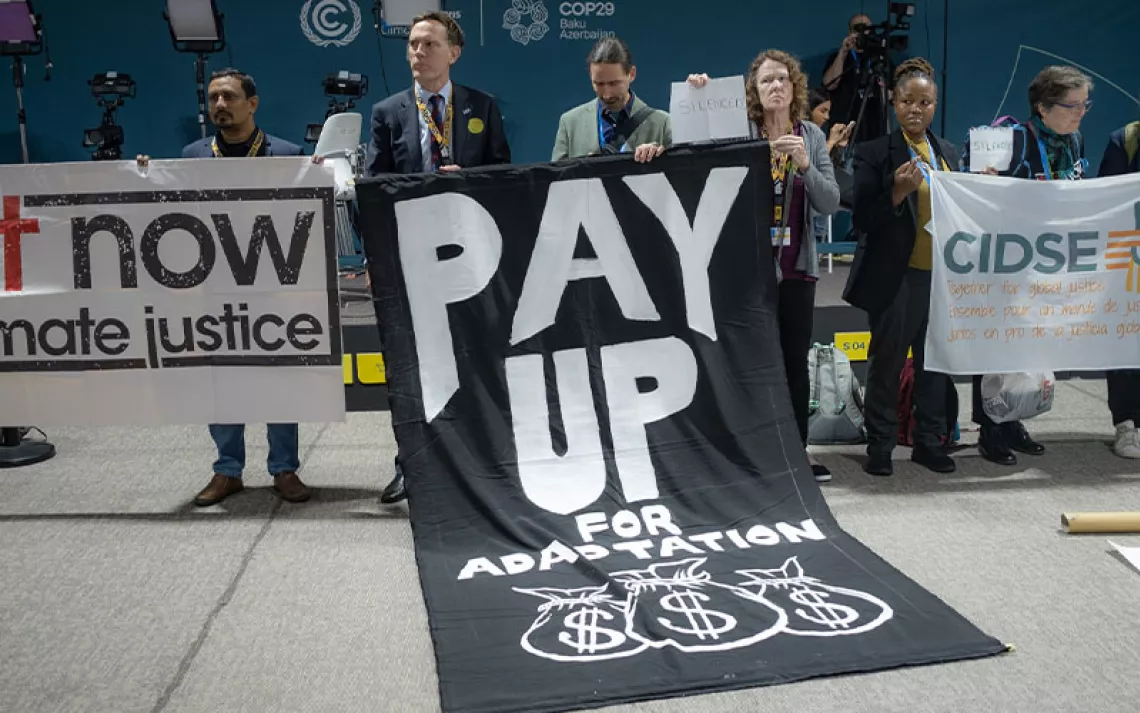Thousands Gather in Nationwide Protests Against Fossil Fuel Financing
Climate action advocates call on banks to stop investing trillions in fossil fuel companies

Chris O'Keeffe of Marlborough, Massachusetts, poses with the Chase credit card he cut up at the Boston protest. | Photo by Grace van Deelen
Climate activists in over 100 cities held boisterous rallies in front of banks Tuesday to demand that top US lenders stop financing the expansion of the fossil fuel sector. Led by Third Act, a climate advocacy group for Americans aged 60 and older, protesters sang songs and cut up their credit cards to send a message to big banks that it’s time to, in their words, “stop funding fossil fuels.”
Since 2016, the world’s largest banks have invested a combined $4.6 trillion in the fossil fuel sector, which has allowed coal, oil, and gas companies to build new fossil fuel infrastructure, according to an analysis titled Banking on Climate Chaos, prepared by Rainforest Action Network, Oil Change International, and other groups. These investments threaten the rapid transition away from fossil fuels that the Intergovernmental Panel on Climate Change says is necessary for a livable future. At the nationwide protests, customers of the largest US banks threatened to take their business elsewhere if the lenders continue to invest in fossil fuels.
“They’re using your money to fund the climate crisis,” said Monte Pearson, a Third Act member, to the crowd gathered in front of Chase Bank in Boston. Along with Wells Fargo, Citibank, and Bank of America, JPMorgan Chase is one of the four banks with the most money invested in the fossil fuel sector.
In Boston’s Financial District, protesters marched from Chase to Bank of America’s Boston headquarters, carrying signs that read “Banks: Stop Funding Fossil Fuels” and chanting “Stop fossil fuel loans.” Some marchers snapped or cut their Chase and Bank of America credit cards in half, while a man with a solar-powered chainsaw sliced larger-than-life plywood credit cards in front of a cheering crowd.
“It’s unconscionable for us to not do something,” said Chris O’Keeffe, one of the Boston-area Third Act members who cut their Chase credit card at the event. O’Keeffe doesn’t have children but said he’s worried about the future his 10 nieces and nephews face. “It’s not so important, me cutting up my cards. But if I’m one of tens of thousands or hundreds of thousands of people doing it, that makes a difference, even to Chase.”
“I’ll easily find a new credit card,” O’Keeffe told the crowd. “One that doesn’t make me ashamed.”

Youths from a group called Humble Bees march with hundreds of protesters down 13th Street NW in DC to urge banks to stop funding fossil fuel development. | Photo by Lindsey Botts

Climate activist Bill McKibben snaps a photo alongside elder volunteers sitting in rocking chairs outside a CitiBank location in downtown Washington, DC, as they protest the billions of money the bank has funneled toward fossil fuels. | Photo by Lindsey Botts
The involvement of older Americans in climate action against financial institutions is especially important, said Meg Clough, a member of Third Act Massachusetts who helped organize the Boston gathering. Since her generation owns the majority of money deposited in banks and investment funds, Clough said, Americans over 60 can play an especially important role in climate action against lenders. “We have time, we have the experience, we have the power, we have the energy, we have the wisdom,” she said. “This is something [older Americans] should be focusing on.”
At Franklin Park in Washington, DC, just blocks from the White House, hundreds of activists, union members, elders, and youths gathered under blue skies to hear guest speakers relay the importance of action against fossil fuel financing. Callie, a 14-year-old environmental activist from Richmond, Virginia, gave a moving speech about her experience as a young person in the era of climate change and the importance of justice in the climate movement.
“People have been profiting off the destruction of our planet for decades, and they will continue to do so unless we stand up and stop them,” she said. “We have to be the force that builds the future that we all need.”
After hearing from author and climate activist Bill McKibben, a cofounder of Third Act, and Sierra Club executive director Ben Jealous, the crowd marched toward a Bank of America branch, then to the intersection of New York Avenue and 14th Street, where both Chase and Wells Fargo have locations.
“It’s time for these banks to start acting responsibly,” McKibben said. “If we bring our power fully to bear, then we will play a decisive role in helping with the greatest problem that we will ever face.”
Four “dirty banks”
Wells Fargo, JPMorgan Chase, Citibank, and Bank of America have invested a combined $1.17 trillion in fossil fuel companies since 2016, according to the Banking on Climate Chaos report. JPMorgan Chase has invested the most into the fossil fuel sector, some $382 billion since 2016. Its investment portfolio includes billions of dollars invested into gas fracking, tar sands, offshore oil, and Arctic oil and gas projects.
In response to the protests, JPMorgan sought to defend its lending portfolio. “In 2021 and 2022, we facilitated more than $175 billion for green activities like renewable energy, energy efficiency and sustainable transportation,” a company spokesperson said in a statement. “We are also taking pragmatic steps to meet our 2030 emission intensity reduction targets in the six sectors that account for the majority of global emissions, while helping the world meet its energy needs securely and affordably.”
From 2020 to 2021, JPMorgan Chase increased its investments in the fossil fuel sector by $10 billion, according to the Banking on Climate Chaos report.
The demonstrations are especially important given the recent bank failures in the United States, such as that of Silicon Valley Bank, wrote McKibben and Jealous in a recent op-ed in The Guardian. “The biggest banks—Chase, Citi, Wells Fargo, Bank of America—will probably get even bigger … if they’re going to hold that much power over the planet’s economy, we need them to recognize and help with our great crises,” McKibben and Jealous wrote.
“It’s time for the banks to stop financing oil and gas expansion,” Jealous said at the DC event. “We must have banks that are serious about betting on a better future for all of us.” Jealous noted his disappointment in President Biden’s recent decision to approve the Willow Project in Alaska, and said the decision brings “a different level of urgency” to the fight against fossil fuel financing.
Continued action
US banks will soon start holding their annual shareholders meetings, where investors—from ordinary shareholders to public pension funds and large asset management firms—can vote on important climate resolutions or register their discontent with how a bank is operating. The organizers of Tuesday’s protests hope that the events will raise awareness of climate change among shareholders who may attend those meetings in the coming weeks.
It is possible for a bank to be both financially successful and environmentally sustainable, said Ben Cushing of the Sierra Club’s Fossil-Free Finance campaign, both because fossil fuel investments are usually a small proportion of a bank’s full portfolio and because the climate crisis will continue to destabilize the financial industry. “Our banks would actually be better off if they phased out their fossil fuel financing and shifted away from these dirty assets, because they will be increasingly risky and volatile over time,” he said. “Continuing to invest in fossil fuels and enabling fossil fuel companies to expand their operations will make the climate crisis worse, and the impacts of climate change will hurt the economy and the financial system.”
Some European banks have already made commitments to move away from financing fossil fuel projects. Europe’s largest bank, HSBC, announced last year that it would no longer finance new oil and gas projects, while Denmark's and Britain’s biggest banks have made similar commitments.
“This isn’t a pie-in-the-sky type of request,” said Clough from Third Act. “It has happened elsewhere and it can happen here.”
Lindsey Botts contributed reporting to this article.
 The Magazine of The Sierra Club
The Magazine of The Sierra Club



